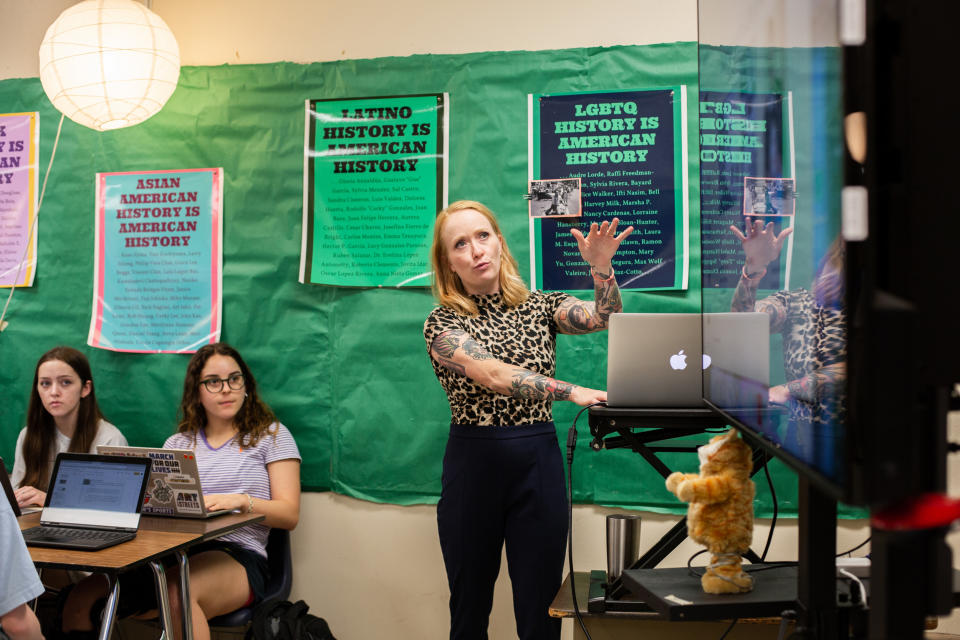Texas bills to fund private school set off heated debate among parents and teachers
AUSTIN, Texas — Glennda Hardin awoke before sunrise and drove an hour from Temple to the state Capitol, her prepared speech folded neatly in her handbag. Hardin, a 73-year-old retired teacher, had never done anything like this before, she said. But once she’d heard what Republican legislators had planned for the state’s education system, she knew she had to come speak her mind.
All that money — meant for public schools like the ones she taught at for three decades — going to pay for private school tuition. “I really believe the future of our schools is at stake,” Hardin said. Her hands trembled in the back of a committee room Wednesday as she clutched the paper, waiting for her chance to testify as the minutes stretched to hours and one hour bled into the next.
Hardin was among hundreds of educators, parents, school officials and activists who came to sound off about a slate of bills that would fundamentally reshape the state’s education system in response to conservative grievances over the ways public schools address racism, history and LGBTQ inclusion.
The centerpiece of the package, Senate Bill 8 — dubbed The Texas Parental Bill of Rights by its GOP authors — would give parents who want to pull their children out of public school $8,000 a year to cover home-schooling expenses or private school tuition. Those who chose to keep their children in public schools would be granted new oversight over what students were taught and what books they could access. The 53-page bill also includes a provision, similar to one adopted a year ago in Florida, that would prohibit public schools from providing instruction or activities “regarding sexual orientation or gender identity” at all grade levels.

Gov. Greg Abbott has thrown his enthusiastic support behind the legislative package, arguing that the changes are needed to protect children from being indoctrinated with a “woke agenda” in Texas public schools.
Perla Muñoz Hopkins, a mother who leads the Texas chapter of the conservative activist group Moms for America, said she believes children and parents are being “persecuted” for their conservative Christian beliefs in public schools. “At this point,” she said, “parents are desperate for options to have our inalienable rights honored.”
But some speakers argued that the bill would finance a different type of indoctrination — providing government funding for private Christian schools — while suppressing the freedoms of LGBTQ students and educators.
Anna Smith, a member of the public school board in Leander, an Austin suburb where parents have packed meetings to complain about sexually explicit library books, came to the legislative hearing wearing a pride flag on her lapel. After two years of political attacks on local schools, Smith said she’s worried that those controversies are being used as a pretext to siphon public school funding away.
“With this bill, we’re going to go one of two ways with public education in Texas,” she said. “And I’m worried.”
Some speakers came in matching shirts: “My school. My child. My choice.” A man scribbled a handwritten message to legislators on his white T-shirt: “Don’t take my tax dollars to pay for your kid’s private school.”
Vera Billingsley, wearing a red blazer over a “Parents Matter” T-shirt, said she came to tell legislators she supports their plans and hopes they go further: Not only should parents be given money for private Christian academies, but the same biblical values that guide curricula in those schools should also be mandated in public school classrooms.
“We’re forgetting our moral moorings,” said Billingsley, who’s running for a seat on the Northside Independent School District board of trustees in San Antonio. “If they would bring the Proverbs every day into the school like I did with my kids at home, they would be fine.”
The Legislature is also weighing a constitutional amendment, introduced by Republican Sen. Angela Paxton, that would guarantee parents’ rights “to direct the education” of their children, including the freedom to send them to religious schools. On Monday, her husband, Attorney General Ken Paxton, issued an opinion arguing that government funding for private religious schools is legal under the Texas Constitution.
The Rev. Holly Bandel, a pastor at First United Methodist Church in Dallas, said she worries legislators are chipping away at the separation of church and state at a time when more Americans are openly embracing Christian nationalism — the belief that America was founded as a Christian nation and that government policy should be guided by biblical values.
Bandel is a member of Pastors for Texas Children, a group of 1,000 pastors and other faith leaders who advocate for equity in public schools.
“An essential part of providing equity in our nation is that we are not imposing beliefs on people,” Bandel said.
An unusual coalition came out against the bill: Democrats who oppose private school vouchers on ideological grounds, small-town Republicans who worry the plan would gut public school funding in rural districts and conservative Christian home-school parents who would benefit financially from the legislation but who fear government money would lead to new restrictions on their freedom to educate their children as they see fit.
The bill’s author, Republican Sen. Brandon Creighton, the chairman of the Education Committee, said at the start of the hearing that legislators intend to fully support public schools — including by giving teachers raises and new job protections in a separate bill — while offering parents more options.
Hardin, the retired teacher, who was still waiting for her turn to testify eight hours after the hearing started, doesn’t believe that.
“This isn’t about helping public schools,” she said. “It’s a program to give a break to affluent parents who want to send their children to private Christian schools. Period.”
This article was originally published on NBCNews.com

